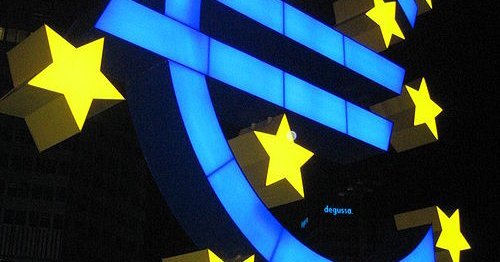Christine Lagarde, the French Minister for Economy and Finances, quits the government, declaring that evening on the set of Canal + channel that she “still does not understand how this had come to be”. If only she did….
At the end of March 2011 the sovereign debt crisis finally hits Portugal. Having been turned away by the newspaper“Liberation”, the journalist Quatremer publishes an article on his blog proving that, contrary to the pledges made before by the Franco-German couple , Sócrates had been covering up the state of his public finances since August 2010. National debt is estimated to be more than 11 percentage points of GDP. As a result of these revelations, Portuguese treasury bills become worthless. Interest rates soar. On the 25 March, 1 euro is worth 1.22 dollars.
Angela Merkel, “infuriated”, as she is afterwards described by the German diplomat who had informed the chancellor, refuses to activate the European Stabilisation Mechanism in light of such “deceit”, as she states in an icy press release. A description which had replaced the word “betrayal” thanks to a last-minute saving intervention by her cabinet director.
All of this is followed by 3 weeks of stock market panic. Fuelled by Reuters’ prophetic dispatches on the spread of the crisis, the Spanish debt note falls to A-, and at the beginning of the afternoon on the 14th of April, the euro is worth less than the dollar.
At the same time, the directors of the eurozone have been locked in session for more than 36 hours at the headquarters of the European Commission in an attempt to save the Iberian peninsula. During the night a Slovenian newspaper correspondent in Brussels tweets a photo of Jean-Claude Trichet pointing a vindictive finger beneath Angela Merkel‘s chin. On the morning of the 15th of April 2011, Jean-Claude Juncker, in a trembling voice, announces a setback in negotiations. The next day, the IMF presents a plan to save Portugal, Spain and Belgium. The debts are to be re-structured in exchange for the governments implementation of unprecedented austerity measures. The salaries of civil servants are frozen for three years. Queue demonstrations...
In Brussels the Commission is going off the rails. Barroso’s self-esteem has been destroyed during the Iberian crisis. A depressive one might call him. Catherine Ashton now spends 3 days out of 5 in the UK and Herman Van Rompuy exhausts himself trying to establish an all-satisfying plan for the partition of Belgium. The nations of Europe are going their own ways.
On Friday the 3rd of June, the euro stabilises at 0.8 to the dollar, and the summer remains calm. The boosted levels of exportation, owing to the collapse of the exchange rate, restore a sense of optimism in European capitals. However, Axel Weber, president of the German Central Bank, announces to Spiegel that he anticipates “inevitable inflation” in Germany and in the eurozone. The German doctrine in financial matters gets over it: with the growth in exportation boosting business earnings, the demand for improved wages in France, Germany and Central and Eastern Europe becomes increasingly pressing.
On Tuesday the 7th of September the European Commission confirms an expected inflation of 5.8% in the eurozone in the second half of 2011. On Sunday 16th October, Dominique Strauss-Kahn crushes Ségolène Royal and Benoît Hamon in the socialist primaries. The following week a IFOP poll puts Marine Le Pen in second place for the presidency with 23% of the polls. Her scathing proclamations about “the Europe that robs us blind” place the single currency at the heart of their campaign.
The options for the Elysée diminish as polls begin to confirm the growing popularity of the Front National candidate. Autumn discussions over the draft financial law are pushed to the breaking point. The new left-wing majority in the Senate have doubts about the deficit forecasts presented by François Baroin, the French Minister for Budget. The ugly figures quickly become the subject of dispute with Brussels, and, naturally, Berlin, who rebuke France for imitating this “Latin trend”.
Nicolas Sarkozy is cornered: he needs to strike hard to counter the Front National, whilst at the same time Dominique Strauss-Kahn is trouncing him in the polls. At the beginning of December, the decision has already been made. At Pessac, in the vaults of the Banque de France, the printing presses are dusted off, and the first few euros are melted. Inflation is at its highest: 7.2% in France for 2011. The euro is dying. The Berlaymont holds its breath. The rest of Europe doesn’t care.
Towards midday on Tuesday the 13th December 2011, an emotionless Claude Guéant descends the front steps of the Elysée.


Follow the comments: |
|
